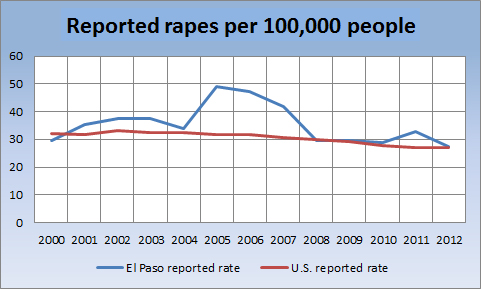EL PASO – Isabel’s big plans for college and medical school were shattered when she was raped and made pregnant when she was 17.

The statue Lady Justice watches over the lobby of the El Paso County Courthouse. According to the National Rape, Abuse and Incest National Network, out of every 100 rapes in the U.S., only three attackers ever serve jail time. Photo by David Chavez, Borderzine.com.
The steps she had made to accomplish her dream were planned out in her mind. She would go away to college and become the accomplished surgeon she had long aspired to be. But everything changed after she was raped by a young man who she believed was her friend.
“It left me devastated emotionally. I couldn’t believe that it had happened to me,” said Isabel, 20. She swore to herself that she would never tell anyone about the rape, but that also changed when she realized she was pregnant.
“I asked myself what was going to happen with my life. What was going to happen with school? What was my family going to think? What were my friends going to think? Was my life over?”
Two months after the incident, Isabel’s pregnancy forced her to report the rape to the police and she was asked to describe the attack several times in great detail.

Source: FBI Uniform Crime Reports
Isabel is one of about 200 persons sexually assaulted in El Paso every year, according to city-data.com, a website that creates detailed data models of subjects in the U.S ranging from crime to weather patterns. These numbers only include the rapes that have been reported to the police.
According to the National Rape, Abuse and Incest National Network (RAINN), approximately 60 percent of rapes in the U.S. go unreported. That number increases to 80 percent in borderland areas along the Texas-Mexico border such as El Paso, according to the Texas Association Against Sexual Assault (TAASA).
Change in reporting by law enforcement
Sexual assaults in El Paso increased in 2014 according to statistics from the El Paso Police Department. In 2013, 19 cases of sexual assaults were reported from January 1 to February 22. It rose to 42 during the same time period in 2014. According to El Paso Police spokesman Sgt. Chris Mears, the reason for the increase in sexual assaults is a change in what gets reported to the federal government.
The definition of sexual assault for rapes reported by law enforcement to the FBI’s Uniform Crime Reporting system changed starting in 2014. Before 2014, rape was defined as vaginal penetration of a female. Now the definition has been broadened to include males and any sexual penetration using a body part or object without the person’s consent.
“The number of sexual assaults we investigate hasn’t changed because we already investigated assaults that didn’t fit the federal definition. What has changed is the number of sexual assaults that we investigate that actually get reported to the FBI,” Mears said.
Between 2000 and 2010, El Paso reported slightly more sexual assaults per 100,000 inhabitants than the yearly national average. In the two years that the city wasn’t above the average, the reported rape rate was at or close to the national average.
Problems with reporting sexual assaults
These statistics only account for cases that are reported to the police. The high number of unreported cases in El Paso and the United States cause the statistics to be less than accurate, according rape advocacy groups like RAINN and TAASA.
“Unreported rapes are a big problem because it doesn’t hold the rapists accountable for their actions, and the victims never get help dealing with their problems,” said Guadalupe Ortiz, direct service administrator at the Sexual Trauma and Assault Response Services (STARS), an El Paso organization.
Ortiz says the higher than average number of unreported rapes in El Paso is caused by the fear and psychological damage the victims suffer after being attacked.
“They fear that they will be judged by others and many of them don’t have the support around them to help them deal with what happened,” Ortiz said. “This usually leads many of them to keep the attack a secret.”
Ortiz also blamed the high number of sexual assaults in the borderland on the small number of prosecutions of attackers. According to RAINN, out of every 100 rapes, only three attackers ever serve jail time.
The psychological trauma and the victims’ fear of reporting to law enforcement lead to more sexual assaults going unreported in El Paso, according to Ortiz.
“Victims feel overwhelmed. They don’t want to talk about their attack at all, which they would have to do if they reported it to the police,” Ortiz said.
Mears said that the Crimes Against Persons Division that handles sexual assault cases are specially trained to investigate every report and to handle the psychological aspects of those cases.
“Our Crime Against Persons Division is trained and carefully investigates every case that gets reported,” he said.
College campuses deal with awareness issues
Unreported sexual assaults are also a major problem on college campuses across the nation. According to an April 2014 report by the White House Task Force to Protect Students from Sexual Assault, one in five female college students has been sexually assaulted, but only 12 percent report the crime to law enforcement.
The report’s objective was to try to find solutions and create awareness. The report took three months to complete and was conducted by a taskforce appointed by President Obama.
The University of Texas at El Paso has investigated 17 reports of forcible sexual offenses between 2011 and 2013, or an average of four reports per year. Four cases were sent to the District Attorney’s office for prosecution and citations were given out in two other cases. There were no charges filed for the remaining cases.
Public Safety Officer Rey Chavez, who heads the UT El Paso police department crime prevention unit, points to increased awareness and outreach on campus for the low number of assaults.
“We have that Rape Aggression Defense course that we do throughout the year and other community outreach in order to help prevent these crimes from happening and to have those that do happen be reported to law enforcement,” Chavez said.
The Rape Aggression Defense Course (RAD) helps students learn the importance of reporting sexual assault, the impact it has on victims, and self-defense tactics that can be used during an assault.
Public awareness is one key step to help stop these crimes from occurring according to Ortiz and the STARS staff.
“If the public knows the impact these assaults have and feel comfortable in reporting them when they happen, I’m sure there wouldn’t be as many of these attacks,” Ortiz said.
STARS is the only agency in El Paso that is certified by TAASA to respond to rape and sexual assault victims. STARS provides an advocate for every sexual assault that occurs in El Paso. Their job is to make sure that the victims understand their rights, ensure that they are being heard by law enforcement, and provide counseling for the psychological damage they have endured.
“The victims aren’t the same person after they are attacked,” Ortiz said. “They change and are so helpless that without any support, their lives will begin to fall apart.”
Help for dealing with trauma
The psychological effects rape victims suffer can be overwhelming. According to the World Health Organization, victims of rape often suffer from depression and post-traumatic stress disorder. They are also four times more likely to contemplate suicide and 13 times more likely to abuse alcohol.
The psychological wounds can be worse when the incident leads to pregnancy. RAINN estimates that there were 17,342 pregnancies as a result of rape in 2012. Victims who become pregnant as a result of the rape are even more psychologically fragile, according to STARS. Pregnancy as a result of rape presents a new set of problems for the victims.
Isabel, a server at two restaurants, explained how her thoughts changed after she found out she was pregnant.
“I went from asking myself why it had happened to me to asking myself if I was going to keep the baby or not. And if I kept the baby would I even love it or just be reminded about my attack,” Isabel said.
Her struggles with the emotional after effects of the attack lasted about a year. According to Isabel, the support she received from STARS was essential for her mental health, but the biggest support she received was from her mother, who stood by her side throughout the pregnancy and legal process.
“The only reason my life didn’t go in a tailspin was because of my mom. She was there for me and never let me get down,” Isabel said.
However, many victims aren’t fortunate to have that type of support.
“I know of many victims that have to deal with their attack on their own because their family is ashamed of them or just don’t care,” Ortiz said.
Isabel decided to keep the child, a girl who is now 2 years old.
Isabel has not forgotten her early dreams and ambitions. She still hopes to pursue a career in the medical field. Although she still has nightmares from the attack, she feels blessed to have a daughter.
“When I was getting closer my due date, I was afraid I wasn’t going to feel anything for my baby,” she said. “I was afraid there wasn’t going to be any connection, but the moment I held her in my arms for the first time, I knew I loved her. I knew she was all mine. My baby girl is my life.”
Help for cases of sexual assault
The Sexual Trauma and Assault Response Services (STARS) offers the following advice for anyone who has been raped or sexually assaulted:
- Make sure you are in a safe environment. If you believe you are still in danger, call 911.
- Contact someone you know and trust, such as a friend, relative, teacher, school counselor, friend’s parent, doctor or religious leader.
- Call STARS for advice, support and help. The rape crisis hotline staff and volunteers are available 24/7 to answer your questions and help you through the recovery process. Call 1.800.656.HOPE (press ONE at the menu).
- If you are under 18, tell a trusted adult. If you do not have any trusted adults in your life or wish to talk confidentially for now, call theChild Help hotline at 1-800-4-A-CHILD.


I would just like to comment on the facts about college reports of rape section you have. I am not specifically talking about the UTEP campus when I say this, but the reason the reporting rates are so low on college campuses is because when the student reports the assault, usually the campus police are the ones to respond, and often times discourage the victim from reporting the crime to city police. If I had any advice for victims on college campuses I would tell them to go directly to EPPD with these sorts of things because most colleges will just hold a disciplinary meeting for the accused and at most they’ll get expelled, and that’s not exactly the type of justice most victims long to see.
This is a great article and a very important one. There is no shame in reporting a sexual assualt or any other type of assualt. YOU are a victim!
Thank you David for bringing this very important topic to light. Most people do not want to hear or talk about these very important issues.